Ethical Considerations: Principles of Care in Healthcare
VerifiedAdded on 2023/06/15
|10
|3541
|285
Essay
AI Summary
This essay explores the significance of principles of care in health and social care practices, detailing their implementation and the influence of legislation, policies, and codes of conduct. It emphasizes balancing individual rights and autonomy with the need to protect vulnerable individuals. The essay discusses the impact of policies, regulations, and legislation on healthcare practices, highlighting their role in maintaining standards, building trust, and protecting user rights. It also addresses the importance of balancing rights and autonomy through strategies like the FREDA principles (fairness, respect, equality, dignity, and autonomy). The essay concludes by examining issues such as discriminatory practices and their adverse effects on health and well-being, advocating for the implementation of effective rules and equal opportunities to protect individuals' rights and self-respect. Desklib provides this and many other solved assignments for students.
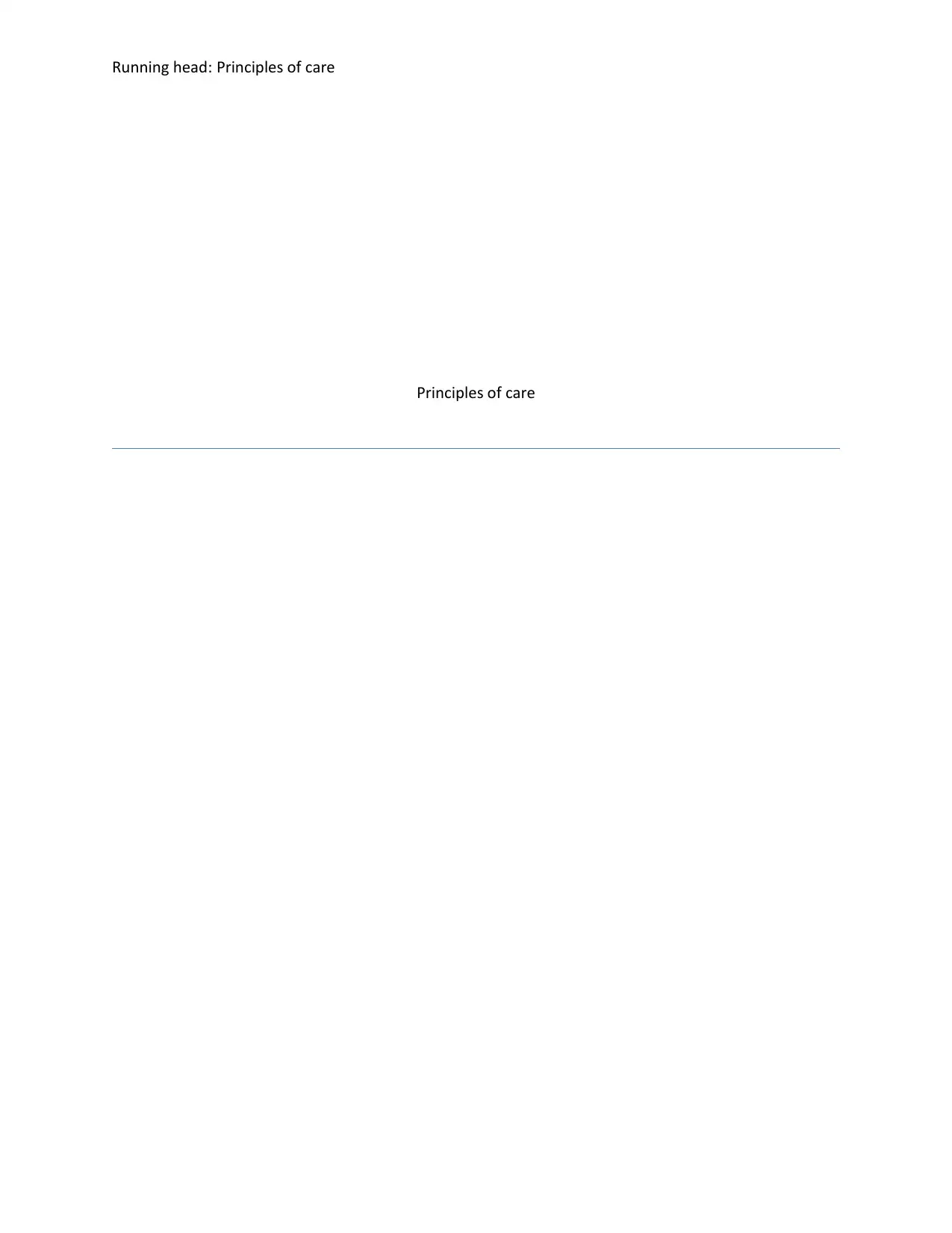
Running head: Principles of care
Principles of care
Principles of care
Paraphrase This Document
Need a fresh take? Get an instant paraphrase of this document with our AI Paraphraser
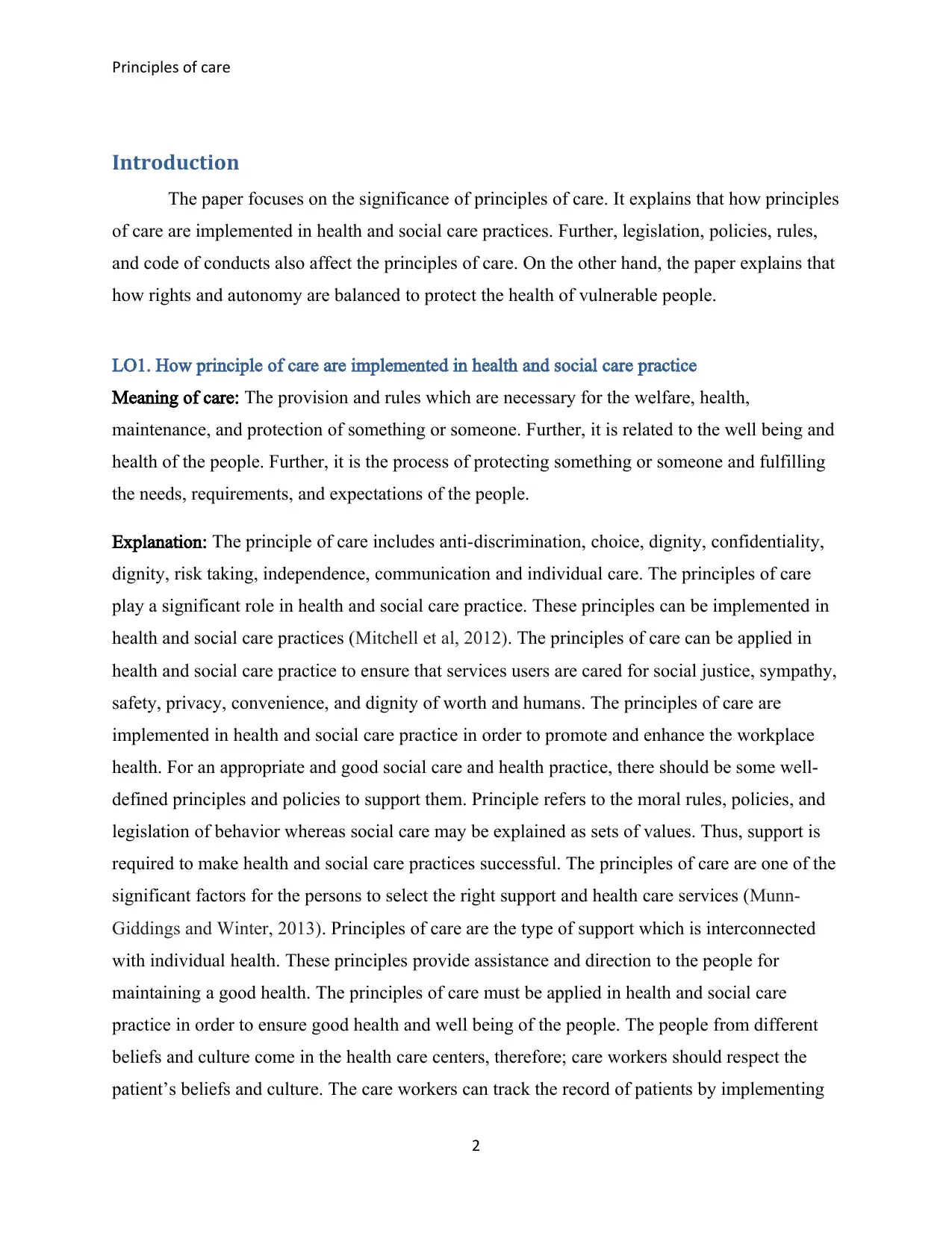
Principles of care
Introduction
The paper focuses on the significance of principles of care. It explains that how principles
of care are implemented in health and social care practices. Further, legislation, policies, rules,
and code of conducts also affect the principles of care. On the other hand, the paper explains that
how rights and autonomy are balanced to protect the health of vulnerable people.
LO1. How principle of care are implemented in health and social care practice
Meaning of care: The provision and rules which are necessary for the welfare, health,
maintenance, and protection of something or someone. Further, it is related to the well being and
health of the people. Further, it is the process of protecting something or someone and fulfilling
the needs, requirements, and expectations of the people.
Explanation: The principle of care includes anti-discrimination, choice, dignity, confidentiality,
dignity, risk taking, independence, communication and individual care. The principles of care
play a significant role in health and social care practice. These principles can be implemented in
health and social care practices (Mitchell et al, 2012). The principles of care can be applied in
health and social care practice to ensure that services users are cared for social justice, sympathy,
safety, privacy, convenience, and dignity of worth and humans. The principles of care are
implemented in health and social care practice in order to promote and enhance the workplace
health. For an appropriate and good social care and health practice, there should be some well-
defined principles and policies to support them. Principle refers to the moral rules, policies, and
legislation of behavior whereas social care may be explained as sets of values. Thus, support is
required to make health and social care practices successful. The principles of care are one of the
significant factors for the persons to select the right support and health care services (Munn-
Giddings and Winter, 2013). Principles of care are the type of support which is interconnected
with individual health. These principles provide assistance and direction to the people for
maintaining a good health. The principles of care must be applied in health and social care
practice in order to ensure good health and well being of the people. The people from different
beliefs and culture come in the health care centers, therefore; care workers should respect the
patient’s beliefs and culture. The care workers can track the record of patients by implementing
2
Introduction
The paper focuses on the significance of principles of care. It explains that how principles
of care are implemented in health and social care practices. Further, legislation, policies, rules,
and code of conducts also affect the principles of care. On the other hand, the paper explains that
how rights and autonomy are balanced to protect the health of vulnerable people.
LO1. How principle of care are implemented in health and social care practice
Meaning of care: The provision and rules which are necessary for the welfare, health,
maintenance, and protection of something or someone. Further, it is related to the well being and
health of the people. Further, it is the process of protecting something or someone and fulfilling
the needs, requirements, and expectations of the people.
Explanation: The principle of care includes anti-discrimination, choice, dignity, confidentiality,
dignity, risk taking, independence, communication and individual care. The principles of care
play a significant role in health and social care practice. These principles can be implemented in
health and social care practices (Mitchell et al, 2012). The principles of care can be applied in
health and social care practice to ensure that services users are cared for social justice, sympathy,
safety, privacy, convenience, and dignity of worth and humans. The principles of care are
implemented in health and social care practice in order to promote and enhance the workplace
health. For an appropriate and good social care and health practice, there should be some well-
defined principles and policies to support them. Principle refers to the moral rules, policies, and
legislation of behavior whereas social care may be explained as sets of values. Thus, support is
required to make health and social care practices successful. The principles of care are one of the
significant factors for the persons to select the right support and health care services (Munn-
Giddings and Winter, 2013). Principles of care are the type of support which is interconnected
with individual health. These principles provide assistance and direction to the people for
maintaining a good health. The principles of care must be applied in health and social care
practice in order to ensure good health and well being of the people. The people from different
beliefs and culture come in the health care centers, therefore; care workers should respect the
patient’s beliefs and culture. The care workers can track the record of patients by implementing
2
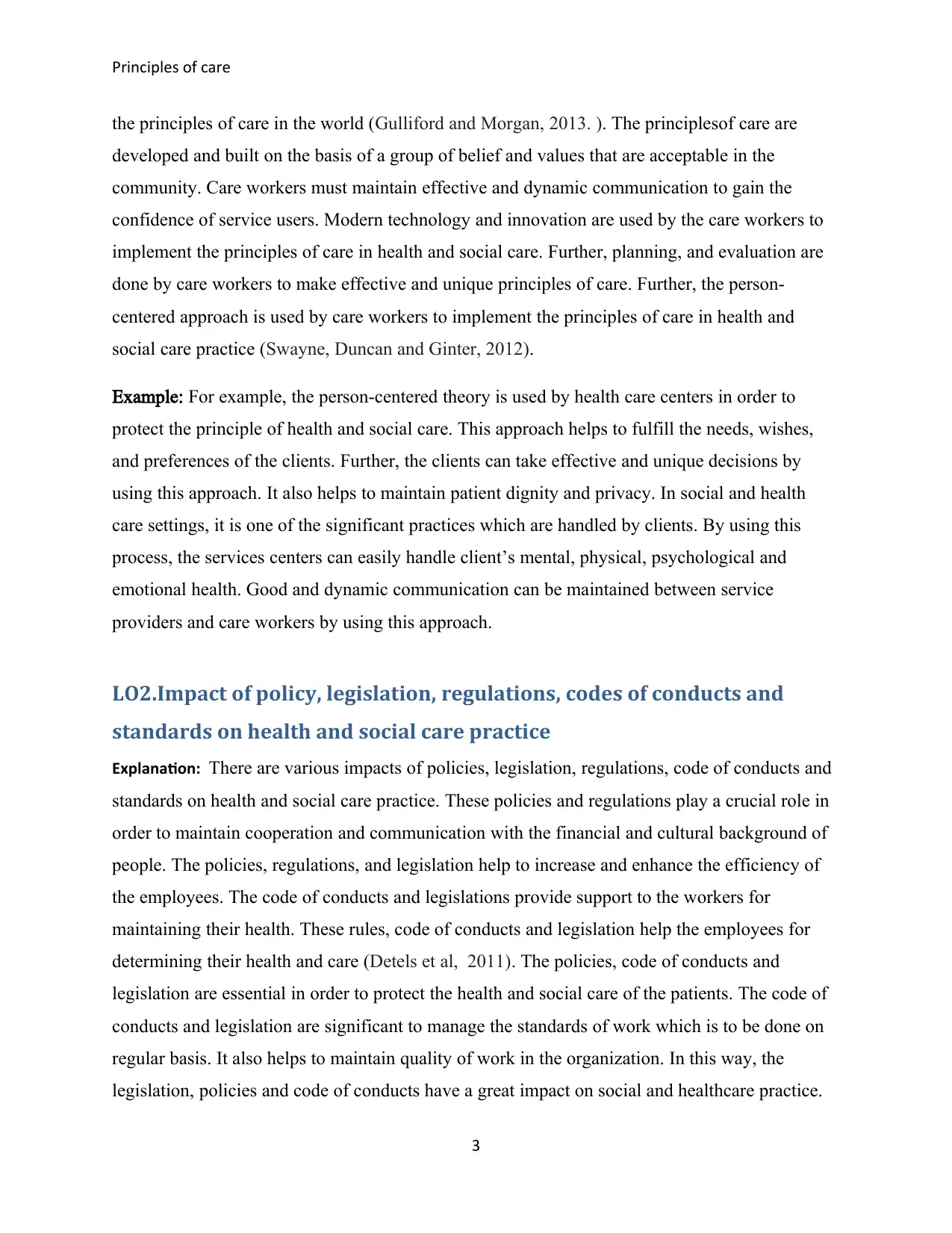
Principles of care
the principles of care in the world (Gulliford and Morgan, 2013. ). The principlesof care are
developed and built on the basis of a group of belief and values that are acceptable in the
community. Care workers must maintain effective and dynamic communication to gain the
confidence of service users. Modern technology and innovation are used by the care workers to
implement the principles of care in health and social care. Further, planning, and evaluation are
done by care workers to make effective and unique principles of care. Further, the person-
centered approach is used by care workers to implement the principles of care in health and
social care practice (Swayne, Duncan and Ginter, 2012).
Example: For example, the person-centered theory is used by health care centers in order to
protect the principle of health and social care. This approach helps to fulfill the needs, wishes,
and preferences of the clients. Further, the clients can take effective and unique decisions by
using this approach. It also helps to maintain patient dignity and privacy. In social and health
care settings, it is one of the significant practices which are handled by clients. By using this
process, the services centers can easily handle client’s mental, physical, psychological and
emotional health. Good and dynamic communication can be maintained between service
providers and care workers by using this approach.
LO2.Impact of policy, legislation, regulations, codes of conducts and
standards on health and social care practice
Explanation: There are various impacts of policies, legislation, regulations, code of conducts and
standards on health and social care practice. These policies and regulations play a crucial role in
order to maintain cooperation and communication with the financial and cultural background of
people. The policies, regulations, and legislation help to increase and enhance the efficiency of
the employees. The code of conducts and legislations provide support to the workers for
maintaining their health. These rules, code of conducts and legislation help the employees for
determining their health and care (Detels et al, 2011). The policies, code of conducts and
legislation are essential in order to protect the health and social care of the patients. The code of
conducts and legislation are significant to manage the standards of work which is to be done on
regular basis. It also helps to maintain quality of work in the organization. In this way, the
legislation, policies and code of conducts have a great impact on social and healthcare practice.
3
the principles of care in the world (Gulliford and Morgan, 2013. ). The principlesof care are
developed and built on the basis of a group of belief and values that are acceptable in the
community. Care workers must maintain effective and dynamic communication to gain the
confidence of service users. Modern technology and innovation are used by the care workers to
implement the principles of care in health and social care. Further, planning, and evaluation are
done by care workers to make effective and unique principles of care. Further, the person-
centered approach is used by care workers to implement the principles of care in health and
social care practice (Swayne, Duncan and Ginter, 2012).
Example: For example, the person-centered theory is used by health care centers in order to
protect the principle of health and social care. This approach helps to fulfill the needs, wishes,
and preferences of the clients. Further, the clients can take effective and unique decisions by
using this approach. It also helps to maintain patient dignity and privacy. In social and health
care settings, it is one of the significant practices which are handled by clients. By using this
process, the services centers can easily handle client’s mental, physical, psychological and
emotional health. Good and dynamic communication can be maintained between service
providers and care workers by using this approach.
LO2.Impact of policy, legislation, regulations, codes of conducts and
standards on health and social care practice
Explanation: There are various impacts of policies, legislation, regulations, code of conducts and
standards on health and social care practice. These policies and regulations play a crucial role in
order to maintain cooperation and communication with the financial and cultural background of
people. The policies, regulations, and legislation help to increase and enhance the efficiency of
the employees. The code of conducts and legislations provide support to the workers for
maintaining their health. These rules, code of conducts and legislation help the employees for
determining their health and care (Detels et al, 2011). The policies, code of conducts and
legislation are essential in order to protect the health and social care of the patients. The code of
conducts and legislation are significant to manage the standards of work which is to be done on
regular basis. It also helps to maintain quality of work in the organization. In this way, the
legislation, policies and code of conducts have a great impact on social and healthcare practice.
3
⊘ This is a preview!⊘
Do you want full access?
Subscribe today to unlock all pages.

Trusted by 1+ million students worldwide
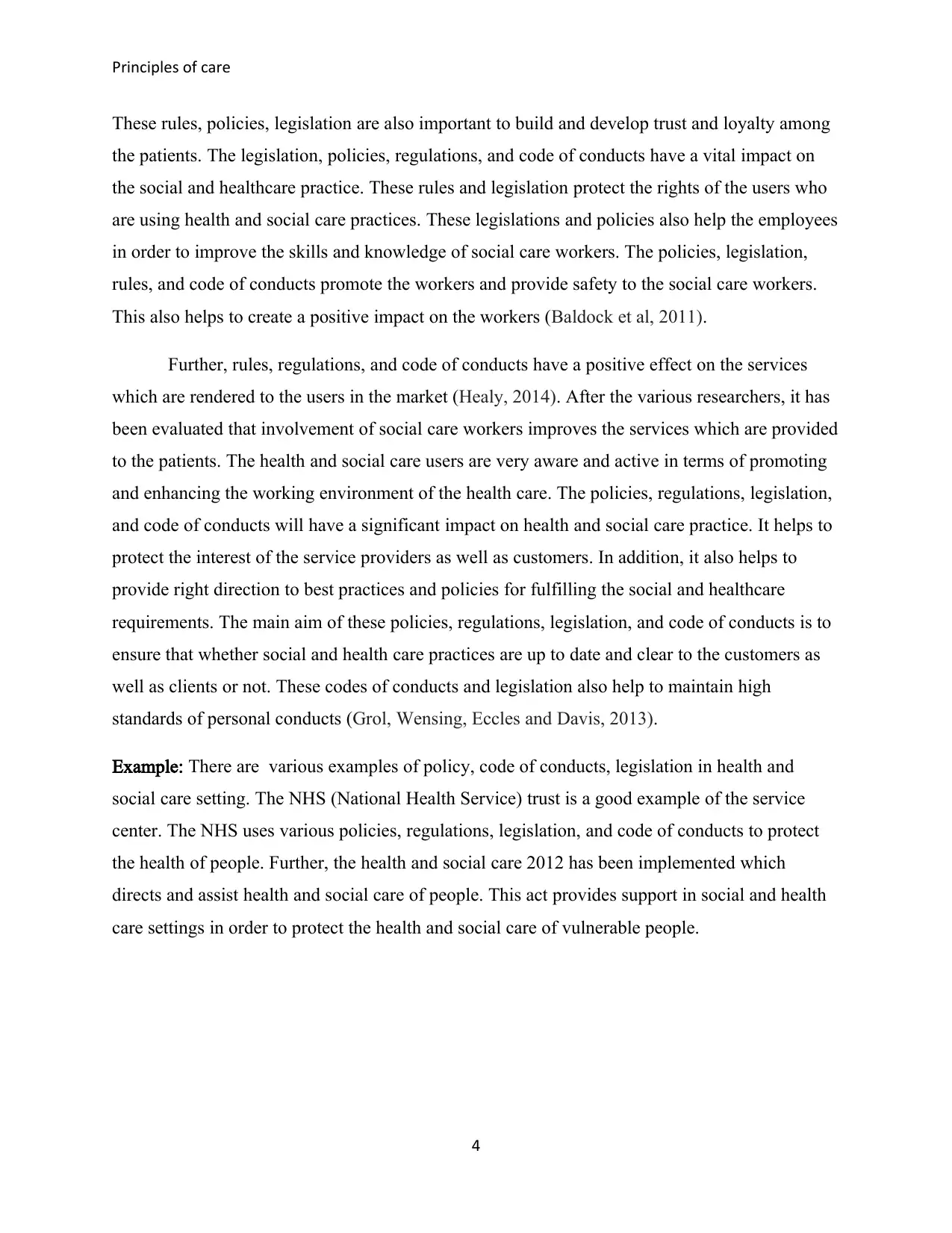
Principles of care
These rules, policies, legislation are also important to build and develop trust and loyalty among
the patients. The legislation, policies, regulations, and code of conducts have a vital impact on
the social and healthcare practice. These rules and legislation protect the rights of the users who
are using health and social care practices. These legislations and policies also help the employees
in order to improve the skills and knowledge of social care workers. The policies, legislation,
rules, and code of conducts promote the workers and provide safety to the social care workers.
This also helps to create a positive impact on the workers (Baldock et al, 2011).
Further, rules, regulations, and code of conducts have a positive effect on the services
which are rendered to the users in the market (Healy, 2014). After the various researchers, it has
been evaluated that involvement of social care workers improves the services which are provided
to the patients. The health and social care users are very aware and active in terms of promoting
and enhancing the working environment of the health care. The policies, regulations, legislation,
and code of conducts will have a significant impact on health and social care practice. It helps to
protect the interest of the service providers as well as customers. In addition, it also helps to
provide right direction to best practices and policies for fulfilling the social and healthcare
requirements. The main aim of these policies, regulations, legislation, and code of conducts is to
ensure that whether social and health care practices are up to date and clear to the customers as
well as clients or not. These codes of conducts and legislation also help to maintain high
standards of personal conducts (Grol, Wensing, Eccles and Davis, 2013).
Example: There are various examples of policy, code of conducts, legislation in health and
social care setting. The NHS (National Health Service) trust is a good example of the service
center. The NHS uses various policies, regulations, legislation, and code of conducts to protect
the health of people. Further, the health and social care 2012 has been implemented which
directs and assist health and social care of people. This act provides support in social and health
care settings in order to protect the health and social care of vulnerable people.
4
These rules, policies, legislation are also important to build and develop trust and loyalty among
the patients. The legislation, policies, regulations, and code of conducts have a vital impact on
the social and healthcare practice. These rules and legislation protect the rights of the users who
are using health and social care practices. These legislations and policies also help the employees
in order to improve the skills and knowledge of social care workers. The policies, legislation,
rules, and code of conducts promote the workers and provide safety to the social care workers.
This also helps to create a positive impact on the workers (Baldock et al, 2011).
Further, rules, regulations, and code of conducts have a positive effect on the services
which are rendered to the users in the market (Healy, 2014). After the various researchers, it has
been evaluated that involvement of social care workers improves the services which are provided
to the patients. The health and social care users are very aware and active in terms of promoting
and enhancing the working environment of the health care. The policies, regulations, legislation,
and code of conducts will have a significant impact on health and social care practice. It helps to
protect the interest of the service providers as well as customers. In addition, it also helps to
provide right direction to best practices and policies for fulfilling the social and healthcare
requirements. The main aim of these policies, regulations, legislation, and code of conducts is to
ensure that whether social and health care practices are up to date and clear to the customers as
well as clients or not. These codes of conducts and legislation also help to maintain high
standards of personal conducts (Grol, Wensing, Eccles and Davis, 2013).
Example: There are various examples of policy, code of conducts, legislation in health and
social care setting. The NHS (National Health Service) trust is a good example of the service
center. The NHS uses various policies, regulations, legislation, and code of conducts to protect
the health of people. Further, the health and social care 2012 has been implemented which
directs and assist health and social care of people. This act provides support in social and health
care settings in order to protect the health and social care of vulnerable people.
4
Paraphrase This Document
Need a fresh take? Get an instant paraphrase of this document with our AI Paraphraser
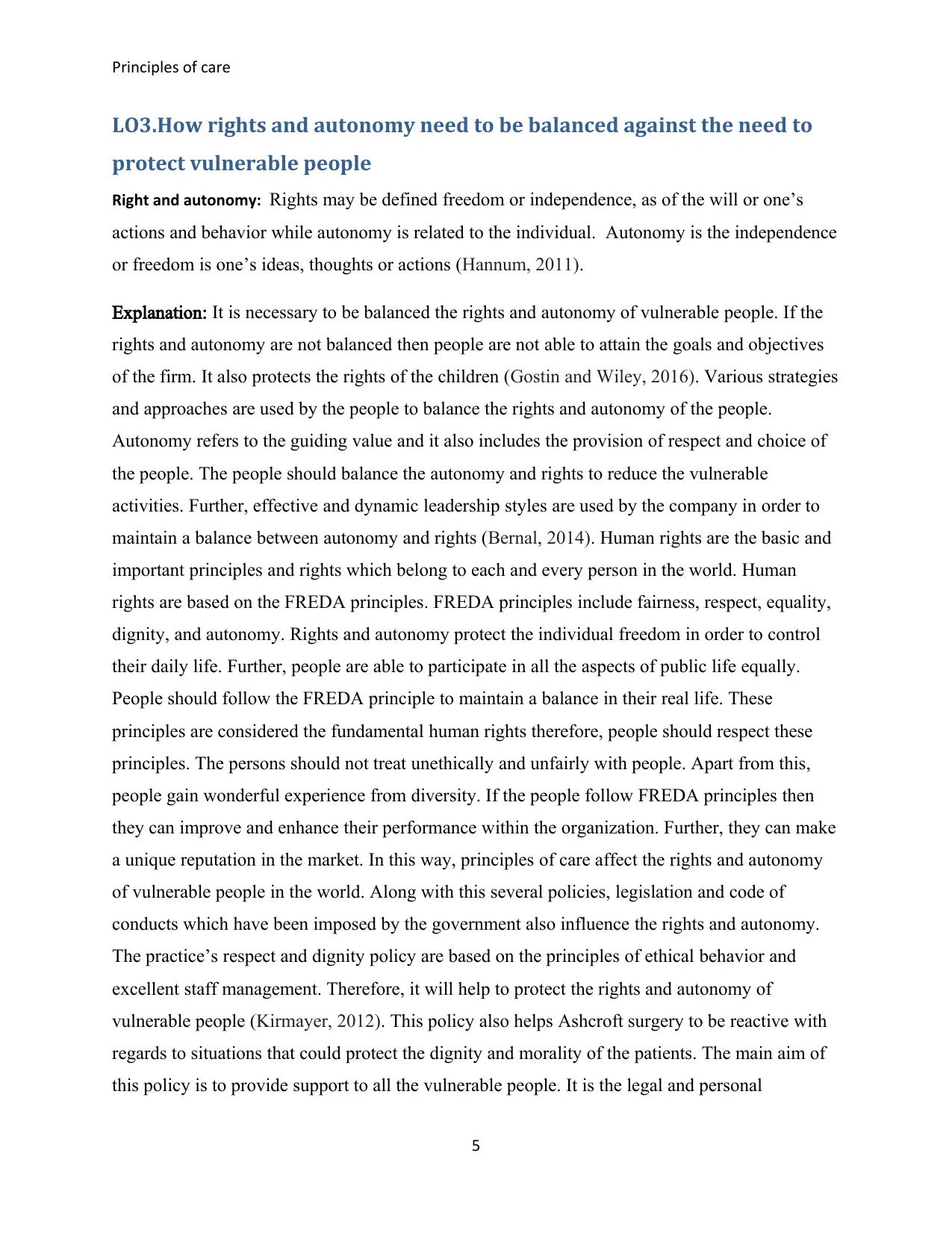
Principles of care
LO3.How rights and autonomy need to be balanced against the need to
protect vulnerable people
Right and autonomy: Rights may be defined freedom or independence, as of the will or one’s
actions and behavior while autonomy is related to the individual. Autonomy is the independence
or freedom is one’s ideas, thoughts or actions (Hannum, 2011).
Explanation: It is necessary to be balanced the rights and autonomy of vulnerable people. If the
rights and autonomy are not balanced then people are not able to attain the goals and objectives
of the firm. It also protects the rights of the children (Gostin and Wiley, 2016). Various strategies
and approaches are used by the people to balance the rights and autonomy of the people.
Autonomy refers to the guiding value and it also includes the provision of respect and choice of
the people. The people should balance the autonomy and rights to reduce the vulnerable
activities. Further, effective and dynamic leadership styles are used by the company in order to
maintain a balance between autonomy and rights (Bernal, 2014). Human rights are the basic and
important principles and rights which belong to each and every person in the world. Human
rights are based on the FREDA principles. FREDA principles include fairness, respect, equality,
dignity, and autonomy. Rights and autonomy protect the individual freedom in order to control
their daily life. Further, people are able to participate in all the aspects of public life equally.
People should follow the FREDA principle to maintain a balance in their real life. These
principles are considered the fundamental human rights therefore, people should respect these
principles. The persons should not treat unethically and unfairly with people. Apart from this,
people gain wonderful experience from diversity. If the people follow FREDA principles then
they can improve and enhance their performance within the organization. Further, they can make
a unique reputation in the market. In this way, principles of care affect the rights and autonomy
of vulnerable people in the world. Along with this several policies, legislation and code of
conducts which have been imposed by the government also influence the rights and autonomy.
The practice’s respect and dignity policy are based on the principles of ethical behavior and
excellent staff management. Therefore, it will help to protect the rights and autonomy of
vulnerable people (Kirmayer, 2012). This policy also helps Ashcroft surgery to be reactive with
regards to situations that could protect the dignity and morality of the patients. The main aim of
this policy is to provide support to all the vulnerable people. It is the legal and personal
5
LO3.How rights and autonomy need to be balanced against the need to
protect vulnerable people
Right and autonomy: Rights may be defined freedom or independence, as of the will or one’s
actions and behavior while autonomy is related to the individual. Autonomy is the independence
or freedom is one’s ideas, thoughts or actions (Hannum, 2011).
Explanation: It is necessary to be balanced the rights and autonomy of vulnerable people. If the
rights and autonomy are not balanced then people are not able to attain the goals and objectives
of the firm. It also protects the rights of the children (Gostin and Wiley, 2016). Various strategies
and approaches are used by the people to balance the rights and autonomy of the people.
Autonomy refers to the guiding value and it also includes the provision of respect and choice of
the people. The people should balance the autonomy and rights to reduce the vulnerable
activities. Further, effective and dynamic leadership styles are used by the company in order to
maintain a balance between autonomy and rights (Bernal, 2014). Human rights are the basic and
important principles and rights which belong to each and every person in the world. Human
rights are based on the FREDA principles. FREDA principles include fairness, respect, equality,
dignity, and autonomy. Rights and autonomy protect the individual freedom in order to control
their daily life. Further, people are able to participate in all the aspects of public life equally.
People should follow the FREDA principle to maintain a balance in their real life. These
principles are considered the fundamental human rights therefore, people should respect these
principles. The persons should not treat unethically and unfairly with people. Apart from this,
people gain wonderful experience from diversity. If the people follow FREDA principles then
they can improve and enhance their performance within the organization. Further, they can make
a unique reputation in the market. In this way, principles of care affect the rights and autonomy
of vulnerable people in the world. Along with this several policies, legislation and code of
conducts which have been imposed by the government also influence the rights and autonomy.
The practice’s respect and dignity policy are based on the principles of ethical behavior and
excellent staff management. Therefore, it will help to protect the rights and autonomy of
vulnerable people (Kirmayer, 2012). This policy also helps Ashcroft surgery to be reactive with
regards to situations that could protect the dignity and morality of the patients. The main aim of
this policy is to provide support to all the vulnerable people. It is the legal and personal
5
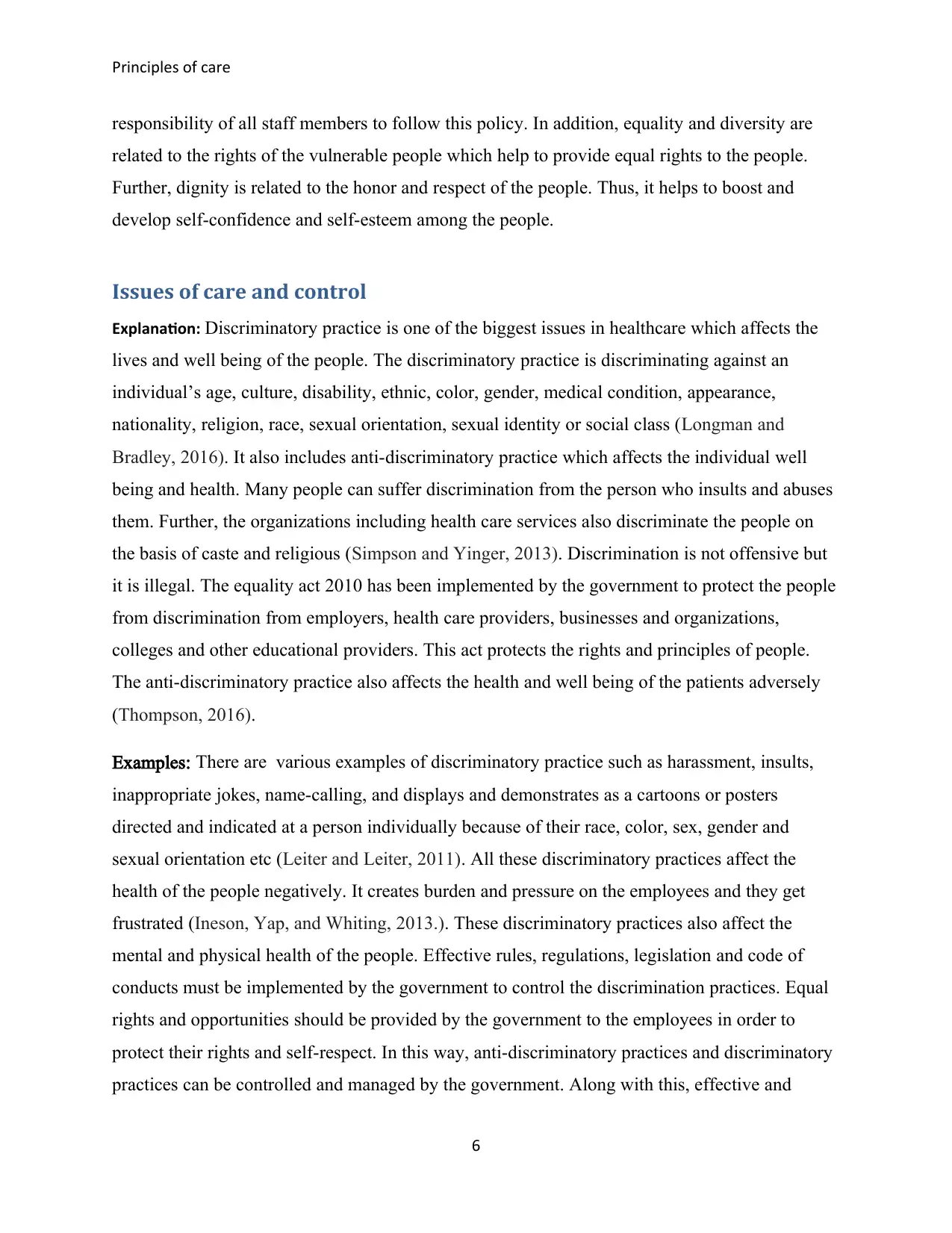
Principles of care
responsibility of all staff members to follow this policy. In addition, equality and diversity are
related to the rights of the vulnerable people which help to provide equal rights to the people.
Further, dignity is related to the honor and respect of the people. Thus, it helps to boost and
develop self-confidence and self-esteem among the people.
Issues of care and control
Explanation: Discriminatory practice is one of the biggest issues in healthcare which affects the
lives and well being of the people. The discriminatory practice is discriminating against an
individual’s age, culture, disability, ethnic, color, gender, medical condition, appearance,
nationality, religion, race, sexual orientation, sexual identity or social class (Longman and
Bradley, 2016). It also includes anti-discriminatory practice which affects the individual well
being and health. Many people can suffer discrimination from the person who insults and abuses
them. Further, the organizations including health care services also discriminate the people on
the basis of caste and religious (Simpson and Yinger, 2013). Discrimination is not offensive but
it is illegal. The equality act 2010 has been implemented by the government to protect the people
from discrimination from employers, health care providers, businesses and organizations,
colleges and other educational providers. This act protects the rights and principles of people.
The anti-discriminatory practice also affects the health and well being of the patients adversely
(Thompson, 2016).
Examples: There are various examples of discriminatory practice such as harassment, insults,
inappropriate jokes, name-calling, and displays and demonstrates as a cartoons or posters
directed and indicated at a person individually because of their race, color, sex, gender and
sexual orientation etc (Leiter and Leiter, 2011). All these discriminatory practices affect the
health of the people negatively. It creates burden and pressure on the employees and they get
frustrated (Ineson, Yap, and Whiting, 2013.). These discriminatory practices also affect the
mental and physical health of the people. Effective rules, regulations, legislation and code of
conducts must be implemented by the government to control the discrimination practices. Equal
rights and opportunities should be provided by the government to the employees in order to
protect their rights and self-respect. In this way, anti-discriminatory practices and discriminatory
practices can be controlled and managed by the government. Along with this, effective and
6
responsibility of all staff members to follow this policy. In addition, equality and diversity are
related to the rights of the vulnerable people which help to provide equal rights to the people.
Further, dignity is related to the honor and respect of the people. Thus, it helps to boost and
develop self-confidence and self-esteem among the people.
Issues of care and control
Explanation: Discriminatory practice is one of the biggest issues in healthcare which affects the
lives and well being of the people. The discriminatory practice is discriminating against an
individual’s age, culture, disability, ethnic, color, gender, medical condition, appearance,
nationality, religion, race, sexual orientation, sexual identity or social class (Longman and
Bradley, 2016). It also includes anti-discriminatory practice which affects the individual well
being and health. Many people can suffer discrimination from the person who insults and abuses
them. Further, the organizations including health care services also discriminate the people on
the basis of caste and religious (Simpson and Yinger, 2013). Discrimination is not offensive but
it is illegal. The equality act 2010 has been implemented by the government to protect the people
from discrimination from employers, health care providers, businesses and organizations,
colleges and other educational providers. This act protects the rights and principles of people.
The anti-discriminatory practice also affects the health and well being of the patients adversely
(Thompson, 2016).
Examples: There are various examples of discriminatory practice such as harassment, insults,
inappropriate jokes, name-calling, and displays and demonstrates as a cartoons or posters
directed and indicated at a person individually because of their race, color, sex, gender and
sexual orientation etc (Leiter and Leiter, 2011). All these discriminatory practices affect the
health of the people negatively. It creates burden and pressure on the employees and they get
frustrated (Ineson, Yap, and Whiting, 2013.). These discriminatory practices also affect the
mental and physical health of the people. Effective rules, regulations, legislation and code of
conducts must be implemented by the government to control the discrimination practices. Equal
rights and opportunities should be provided by the government to the employees in order to
protect their rights and self-respect. In this way, anti-discriminatory practices and discriminatory
practices can be controlled and managed by the government. Along with this, effective and
6
⊘ This is a preview!⊘
Do you want full access?
Subscribe today to unlock all pages.

Trusted by 1+ million students worldwide
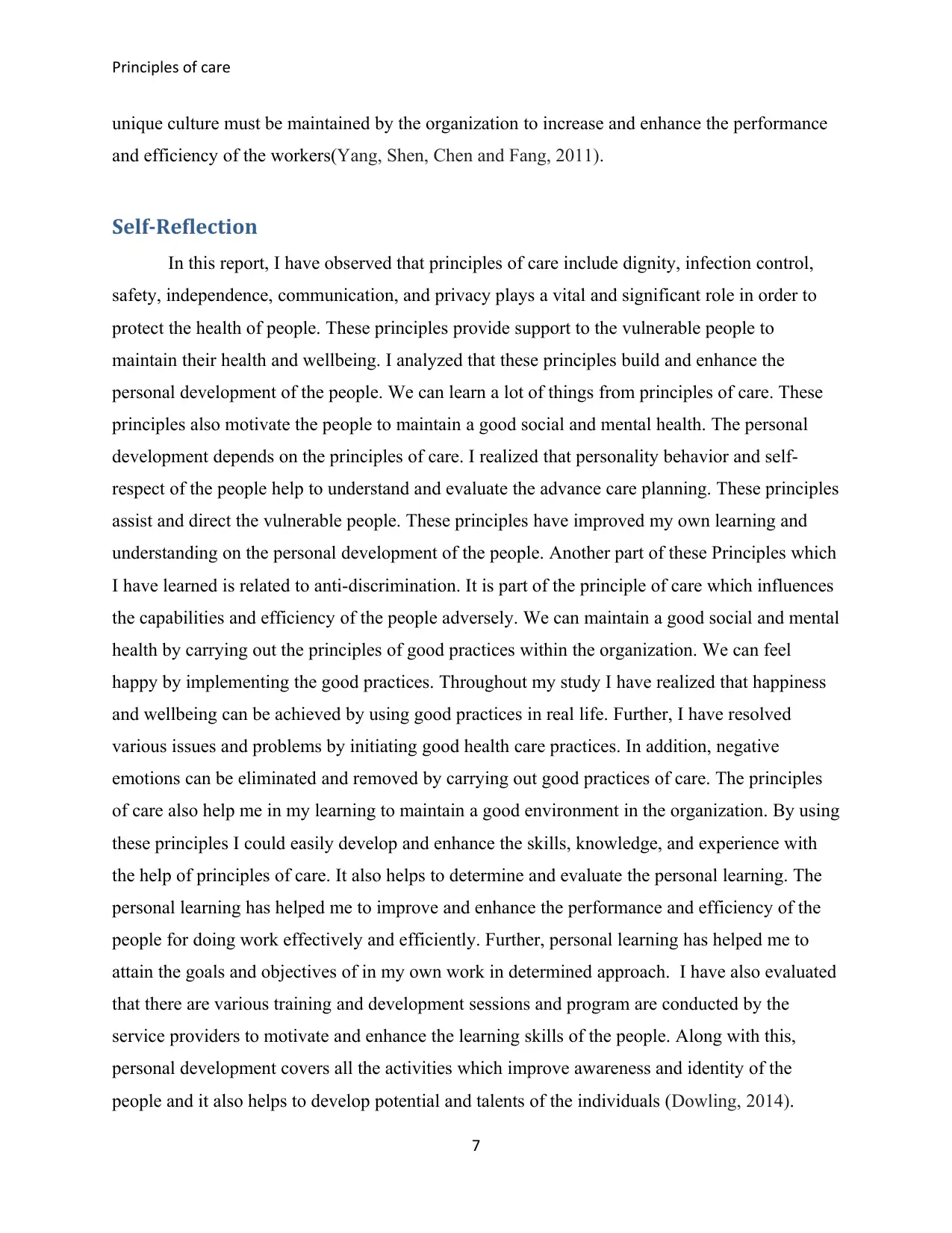
Principles of care
unique culture must be maintained by the organization to increase and enhance the performance
and efficiency of the workers(Yang, Shen, Chen and Fang, 2011).
Self-Reflection
In this report, I have observed that principles of care include dignity, infection control,
safety, independence, communication, and privacy plays a vital and significant role in order to
protect the health of people. These principles provide support to the vulnerable people to
maintain their health and wellbeing. I analyzed that these principles build and enhance the
personal development of the people. We can learn a lot of things from principles of care. These
principles also motivate the people to maintain a good social and mental health. The personal
development depends on the principles of care. I realized that personality behavior and self-
respect of the people help to understand and evaluate the advance care planning. These principles
assist and direct the vulnerable people. These principles have improved my own learning and
understanding on the personal development of the people. Another part of these Principles which
I have learned is related to anti-discrimination. It is part of the principle of care which influences
the capabilities and efficiency of the people adversely. We can maintain a good social and mental
health by carrying out the principles of good practices within the organization. We can feel
happy by implementing the good practices. Throughout my study I have realized that happiness
and wellbeing can be achieved by using good practices in real life. Further, I have resolved
various issues and problems by initiating good health care practices. In addition, negative
emotions can be eliminated and removed by carrying out good practices of care. The principles
of care also help me in my learning to maintain a good environment in the organization. By using
these principles I could easily develop and enhance the skills, knowledge, and experience with
the help of principles of care. It also helps to determine and evaluate the personal learning. The
personal learning has helped me to improve and enhance the performance and efficiency of the
people for doing work effectively and efficiently. Further, personal learning has helped me to
attain the goals and objectives of in my own work in determined approach. I have also evaluated
that there are various training and development sessions and program are conducted by the
service providers to motivate and enhance the learning skills of the people. Along with this,
personal development covers all the activities which improve awareness and identity of the
people and it also helps to develop potential and talents of the individuals (Dowling, 2014).
7
unique culture must be maintained by the organization to increase and enhance the performance
and efficiency of the workers(Yang, Shen, Chen and Fang, 2011).
Self-Reflection
In this report, I have observed that principles of care include dignity, infection control,
safety, independence, communication, and privacy plays a vital and significant role in order to
protect the health of people. These principles provide support to the vulnerable people to
maintain their health and wellbeing. I analyzed that these principles build and enhance the
personal development of the people. We can learn a lot of things from principles of care. These
principles also motivate the people to maintain a good social and mental health. The personal
development depends on the principles of care. I realized that personality behavior and self-
respect of the people help to understand and evaluate the advance care planning. These principles
assist and direct the vulnerable people. These principles have improved my own learning and
understanding on the personal development of the people. Another part of these Principles which
I have learned is related to anti-discrimination. It is part of the principle of care which influences
the capabilities and efficiency of the people adversely. We can maintain a good social and mental
health by carrying out the principles of good practices within the organization. We can feel
happy by implementing the good practices. Throughout my study I have realized that happiness
and wellbeing can be achieved by using good practices in real life. Further, I have resolved
various issues and problems by initiating good health care practices. In addition, negative
emotions can be eliminated and removed by carrying out good practices of care. The principles
of care also help me in my learning to maintain a good environment in the organization. By using
these principles I could easily develop and enhance the skills, knowledge, and experience with
the help of principles of care. It also helps to determine and evaluate the personal learning. The
personal learning has helped me to improve and enhance the performance and efficiency of the
people for doing work effectively and efficiently. Further, personal learning has helped me to
attain the goals and objectives of in my own work in determined approach. I have also evaluated
that there are various training and development sessions and program are conducted by the
service providers to motivate and enhance the learning skills of the people. Along with this,
personal development covers all the activities which improve awareness and identity of the
people and it also helps to develop potential and talents of the individuals (Dowling, 2014).
7
Paraphrase This Document
Need a fresh take? Get an instant paraphrase of this document with our AI Paraphraser
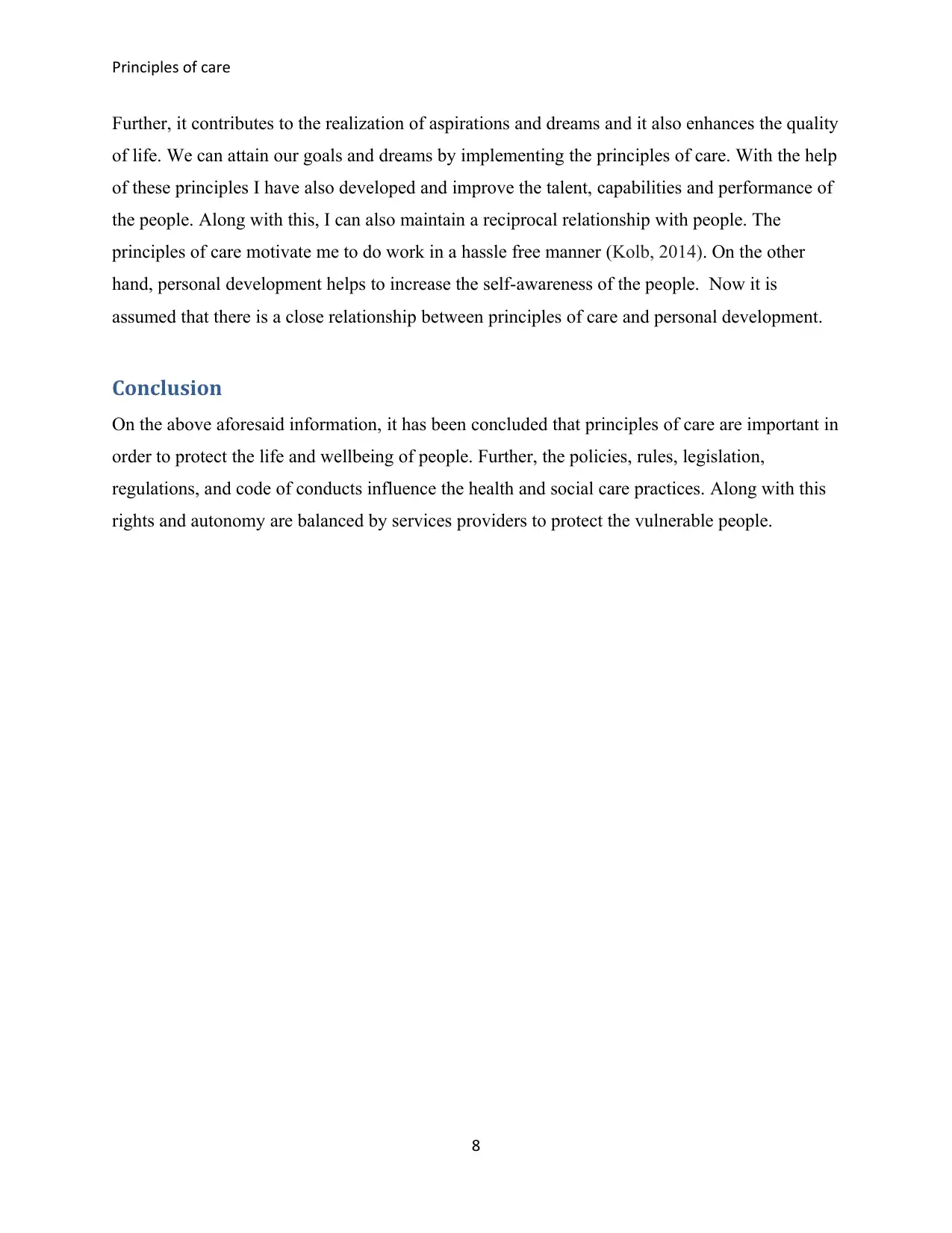
Principles of care
Further, it contributes to the realization of aspirations and dreams and it also enhances the quality
of life. We can attain our goals and dreams by implementing the principles of care. With the help
of these principles I have also developed and improve the talent, capabilities and performance of
the people. Along with this, I can also maintain a reciprocal relationship with people. The
principles of care motivate me to do work in a hassle free manner (Kolb, 2014). On the other
hand, personal development helps to increase the self-awareness of the people. Now it is
assumed that there is a close relationship between principles of care and personal development.
Conclusion
On the above aforesaid information, it has been concluded that principles of care are important in
order to protect the life and wellbeing of people. Further, the policies, rules, legislation,
regulations, and code of conducts influence the health and social care practices. Along with this
rights and autonomy are balanced by services providers to protect the vulnerable people.
8
Further, it contributes to the realization of aspirations and dreams and it also enhances the quality
of life. We can attain our goals and dreams by implementing the principles of care. With the help
of these principles I have also developed and improve the talent, capabilities and performance of
the people. Along with this, I can also maintain a reciprocal relationship with people. The
principles of care motivate me to do work in a hassle free manner (Kolb, 2014). On the other
hand, personal development helps to increase the self-awareness of the people. Now it is
assumed that there is a close relationship between principles of care and personal development.
Conclusion
On the above aforesaid information, it has been concluded that principles of care are important in
order to protect the life and wellbeing of people. Further, the policies, rules, legislation,
regulations, and code of conducts influence the health and social care practices. Along with this
rights and autonomy are balanced by services providers to protect the vulnerable people.
8
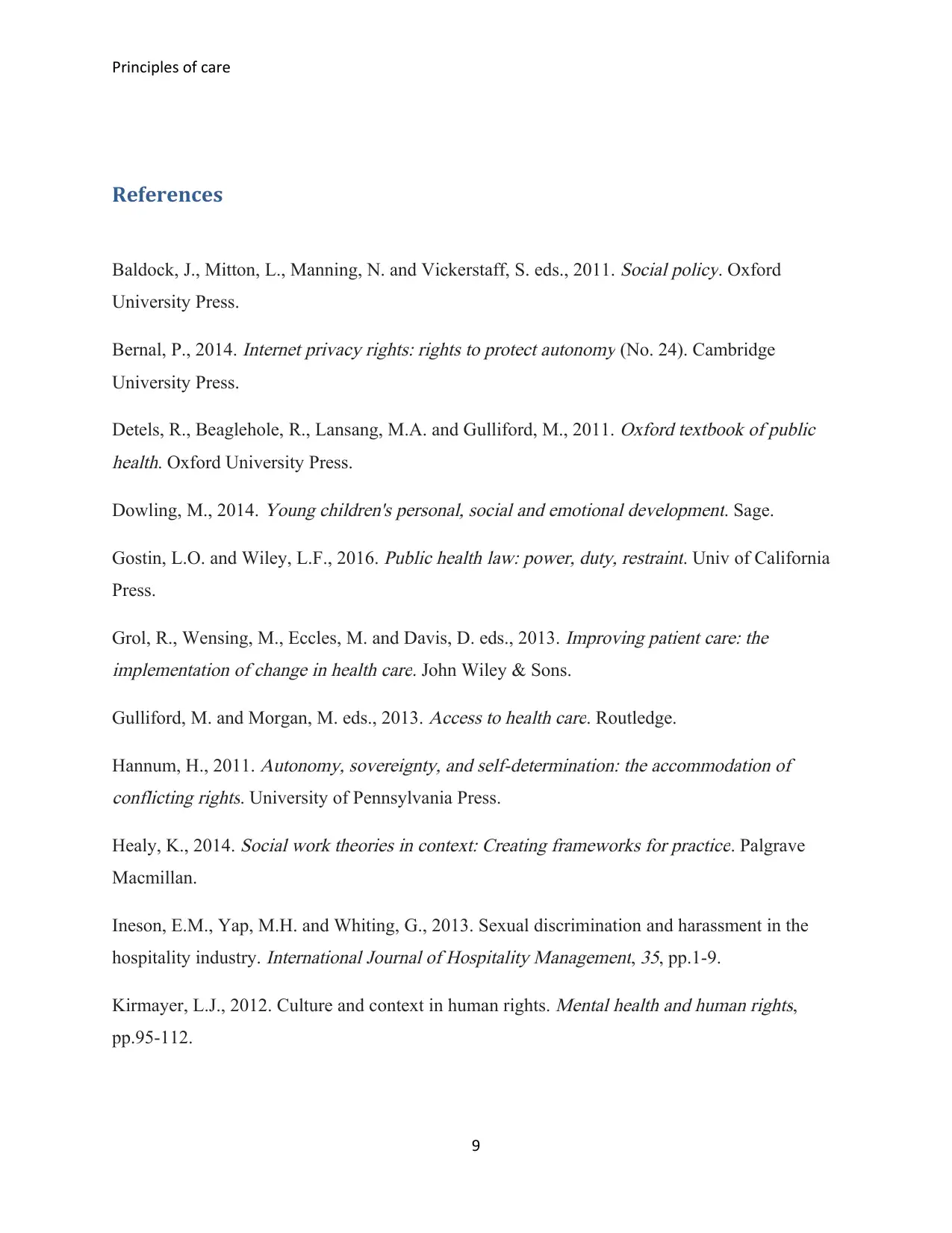
Principles of care
References
Baldock, J., Mitton, L., Manning, N. and Vickerstaff, S. eds., 2011.
Social policy. Oxford
University Press.
Bernal, P., 2014.
Internet privacy rights: rights to protect autonomy (No. 24). Cambridge
University Press.
Detels, R., Beaglehole, R., Lansang, M.A. and Gulliford, M., 2011.
Oxford textbook of public
health. Oxford University Press.
Dowling, M., 2014.
Young children's personal, social and emotional development. Sage.
Gostin, L.O. and Wiley, L.F., 2016.
Public health law: power, duty, restraint. Univ of California
Press.
Grol, R., Wensing, M., Eccles, M. and Davis, D. eds., 2013.
Improving patient care: the
implementation of change in health care. John Wiley & Sons.
Gulliford, M. and Morgan, M. eds., 2013.
Access to health care. Routledge.
Hannum, H., 2011.
Autonomy, sovereignty, and self-determination: the accommodation of
conflicting rights. University of Pennsylvania Press.
Healy, K., 2014.
Social work theories in context: Creating frameworks for practice. Palgrave
Macmillan.
Ineson, E.M., Yap, M.H. and Whiting, G., 2013. Sexual discrimination and harassment in the
hospitality industry.
International Journal of Hospitality Management,
35, pp.1-9.
Kirmayer, L.J., 2012. Culture and context in human rights.
Mental health and human rights,
pp.95-112.
9
References
Baldock, J., Mitton, L., Manning, N. and Vickerstaff, S. eds., 2011.
Social policy. Oxford
University Press.
Bernal, P., 2014.
Internet privacy rights: rights to protect autonomy (No. 24). Cambridge
University Press.
Detels, R., Beaglehole, R., Lansang, M.A. and Gulliford, M., 2011.
Oxford textbook of public
health. Oxford University Press.
Dowling, M., 2014.
Young children's personal, social and emotional development. Sage.
Gostin, L.O. and Wiley, L.F., 2016.
Public health law: power, duty, restraint. Univ of California
Press.
Grol, R., Wensing, M., Eccles, M. and Davis, D. eds., 2013.
Improving patient care: the
implementation of change in health care. John Wiley & Sons.
Gulliford, M. and Morgan, M. eds., 2013.
Access to health care. Routledge.
Hannum, H., 2011.
Autonomy, sovereignty, and self-determination: the accommodation of
conflicting rights. University of Pennsylvania Press.
Healy, K., 2014.
Social work theories in context: Creating frameworks for practice. Palgrave
Macmillan.
Ineson, E.M., Yap, M.H. and Whiting, G., 2013. Sexual discrimination and harassment in the
hospitality industry.
International Journal of Hospitality Management,
35, pp.1-9.
Kirmayer, L.J., 2012. Culture and context in human rights.
Mental health and human rights,
pp.95-112.
9
⊘ This is a preview!⊘
Do you want full access?
Subscribe today to unlock all pages.

Trusted by 1+ million students worldwide
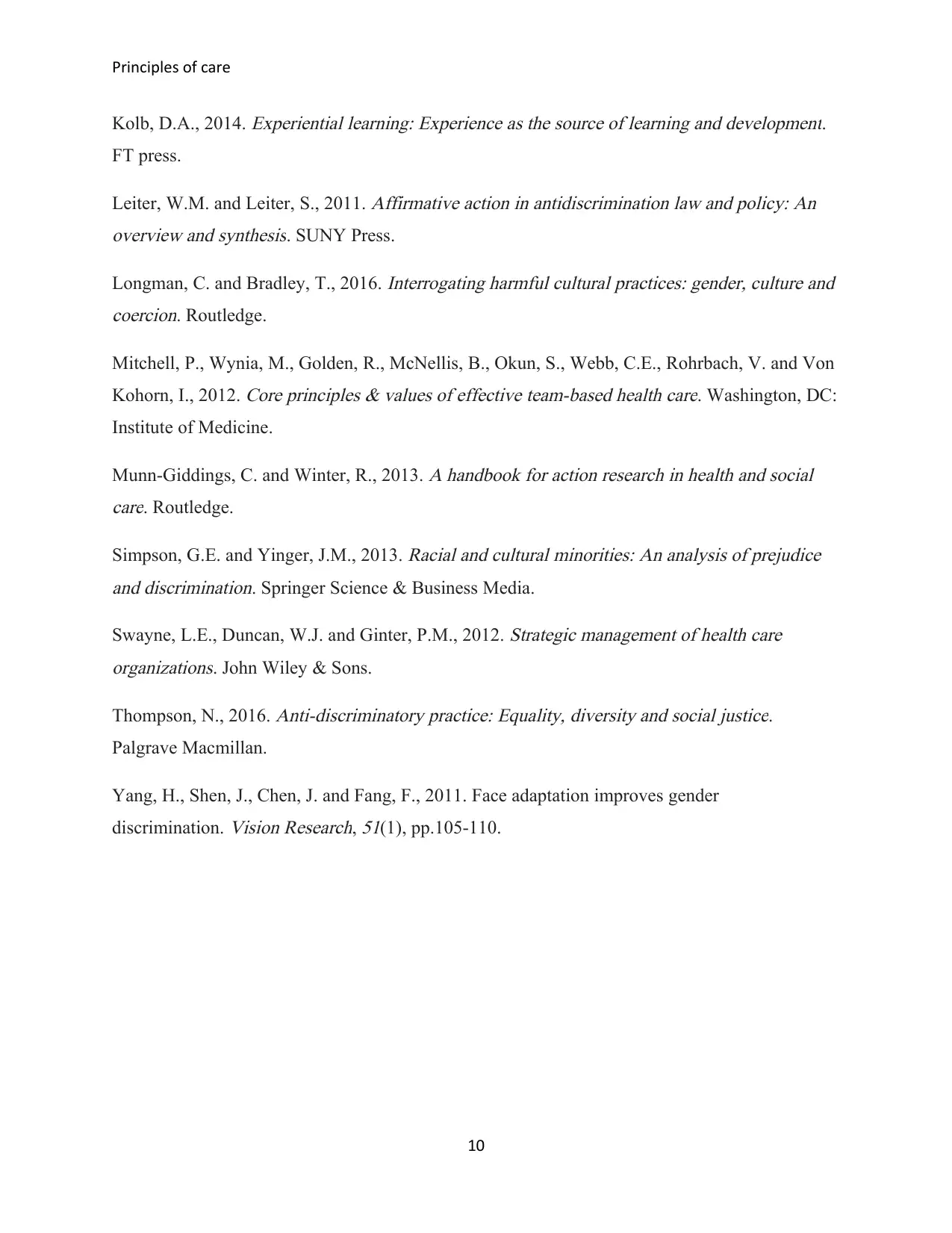
Principles of care
Kolb, D.A., 2014.
Experiential learning: Experience as the source of learning and development.
FT press.
Leiter, W.M. and Leiter, S., 2011.
Affirmative action in antidiscrimination law and policy: An
overview and synthesis. SUNY Press.
Longman, C. and Bradley, T., 2016.
Interrogating harmful cultural practices: gender, culture and
coercion. Routledge.
Mitchell, P., Wynia, M., Golden, R., McNellis, B., Okun, S., Webb, C.E., Rohrbach, V. and Von
Kohorn, I., 2012.
Core principles & values of effective team-based health care. Washington, DC:
Institute of Medicine.
Munn-Giddings, C. and Winter, R., 2013.
A handbook for action research in health and social
care. Routledge.
Simpson, G.E. and Yinger, J.M., 2013.
Racial and cultural minorities: An analysis of prejudice
and discrimination. Springer Science & Business Media.
Swayne, L.E., Duncan, W.J. and Ginter, P.M., 2012.
Strategic management of health care
organizations. John Wiley & Sons.
Thompson, N., 2016.
Anti-discriminatory practice: Equality, diversity and social justice.
Palgrave Macmillan.
Yang, H., Shen, J., Chen, J. and Fang, F., 2011. Face adaptation improves gender
discrimination.
Vision Research,
51(1), pp.105-110.
10
Kolb, D.A., 2014.
Experiential learning: Experience as the source of learning and development.
FT press.
Leiter, W.M. and Leiter, S., 2011.
Affirmative action in antidiscrimination law and policy: An
overview and synthesis. SUNY Press.
Longman, C. and Bradley, T., 2016.
Interrogating harmful cultural practices: gender, culture and
coercion. Routledge.
Mitchell, P., Wynia, M., Golden, R., McNellis, B., Okun, S., Webb, C.E., Rohrbach, V. and Von
Kohorn, I., 2012.
Core principles & values of effective team-based health care. Washington, DC:
Institute of Medicine.
Munn-Giddings, C. and Winter, R., 2013.
A handbook for action research in health and social
care. Routledge.
Simpson, G.E. and Yinger, J.M., 2013.
Racial and cultural minorities: An analysis of prejudice
and discrimination. Springer Science & Business Media.
Swayne, L.E., Duncan, W.J. and Ginter, P.M., 2012.
Strategic management of health care
organizations. John Wiley & Sons.
Thompson, N., 2016.
Anti-discriminatory practice: Equality, diversity and social justice.
Palgrave Macmillan.
Yang, H., Shen, J., Chen, J. and Fang, F., 2011. Face adaptation improves gender
discrimination.
Vision Research,
51(1), pp.105-110.
10
1 out of 10
Related Documents
Your All-in-One AI-Powered Toolkit for Academic Success.
+13062052269
info@desklib.com
Available 24*7 on WhatsApp / Email
![[object Object]](/_next/static/media/star-bottom.7253800d.svg)
Unlock your academic potential
Copyright © 2020–2026 A2Z Services. All Rights Reserved. Developed and managed by ZUCOL.





